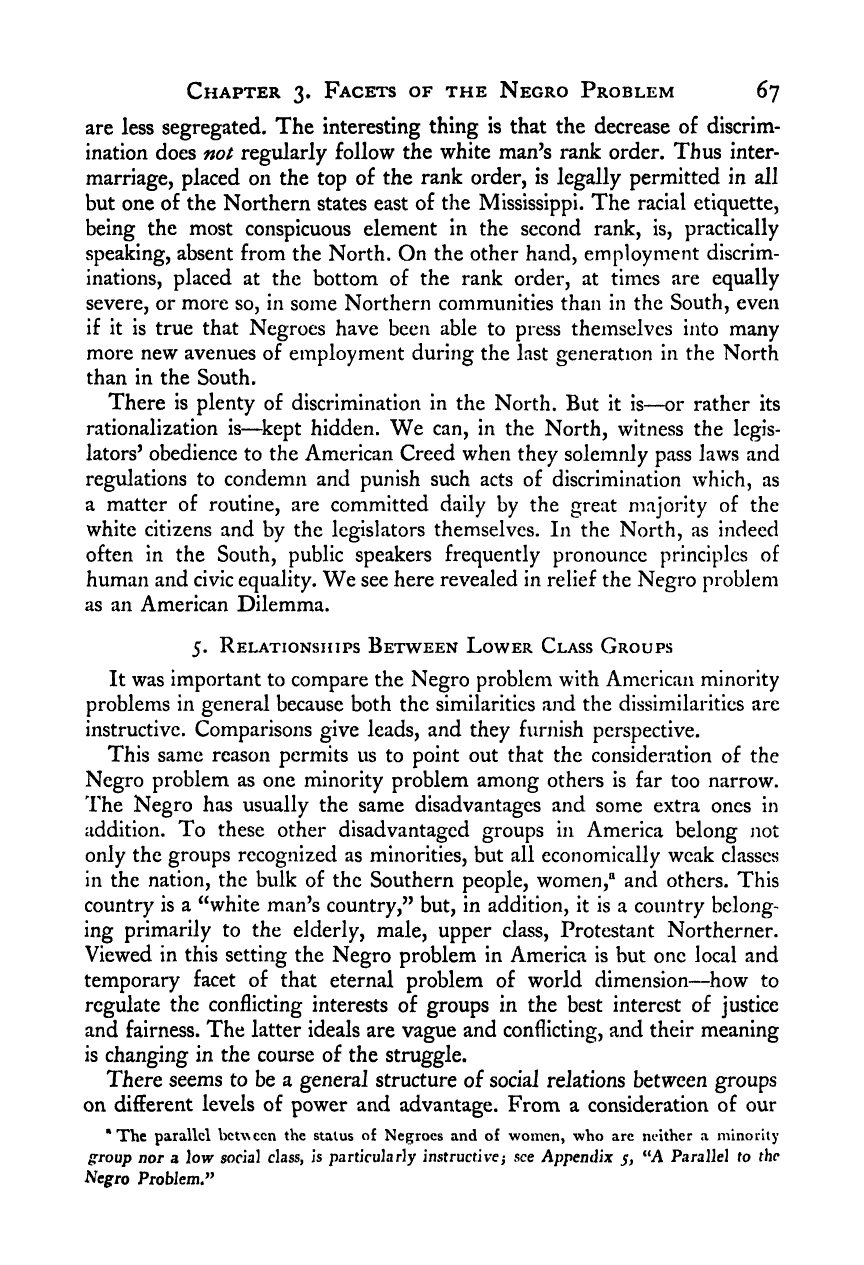Note: Gunnar Myrdal died in 1987, less than 70 years ago. Therefore, this work is protected by copyright, restricting your legal rights to reproduce it. However, you are welcome to view it on screen, as you do now. Read more about copyright.
Full resolution (TIFF) - On this page / på denna sida - I. The Approach - 3. Facets of the Negro Problem - 4. The “Rank Order of Discriminations” - 5. Relationships between Lower Class Groups

<< prev. page << föreg. sida << >> nästa sida >> next page >>
Below is the raw OCR text
from the above scanned image.
Do you see an error? Proofread the page now!
Här nedan syns maskintolkade texten från faksimilbilden ovan.
Ser du något fel? Korrekturläs sidan nu!
This page has never been proofread. / Denna sida har aldrig korrekturlästs.
Chapter 3. Facets of the Negro Problem 67
are less segregated. The interesting thing is that the decrease of discrim-
ination does not regularly follow the white man’s rank order. Thus inter-
marriage, placed on the top of the rank order, is legally permitted in all
but one of the Northern states east of the Mississippi. The racial etiquette,
being the most conspicuous element in the second rank, is, practically
speaking, absent from the North. On the other hand, employment discrim-
inations, placed at the bottom of the rank order, at times are equally
severe, or more so, in some Northern communities than in the South, even
if it is true that Negroes have been able to press themselves into many
more new avenues of employment during the last generation in the North
than in the South.
There is plenty of discrimination in the North. But it is—or rather its
rationalization is—kept hidden. We can, in the North, witness the legis-
lators’ obedience to the American Creed when they solemnly pass laws and
regulations to condemn and punish such acts of discrimination which, as
a matter of routine, are committed daily by the great majority of the
white citizens and by the legislators themselves. In the North, as indeed
often in the South, public speakers frequently pronounce principles of
human and civic equality. We see here revealed in relief the Negro problem
as an American Dilemma.
5. Relationships Between Lower Class Groups
It was important to compare the Negro problem with American minority
problems in general because both the similarities and the dissimilarities arc
instructive. Comparisons give leads, and they furnish perspective.
This same reason permits us to point out that the consideration of the
Negro problem as one minority problem among others is far too narrow.
The Negro has usually the same disadvantages and some extra ones in
addition. To these other disadvantaged groups in America belong not
only the groups recognized as minorities, but all economically weak classes
in the nation, the bulk of the Southern people, women,® and others. This
country is a ‘‘white man’s country,” but, in addition, it is a country belong-
ing primarily to the elderly, male, upper class, Protestant Northerner.
Viewed in this setting the Negro problem in America is but one local and
temporary facet of that eternal problem of world dimension—how to
regulate the conflicting interests of groups in the best interest of justice
and fairness. The latter ideals are vague and conflicting, and their meaning
is changing in the course of the struggle.
There seems to be a general structure of social relations between groups
on diflEerent levels of power and advantage. From a consideration of our
* The parallel hct^^ccn the status of Negroes and of women, who are neither a minority
group nor a low social class, is particularly instructive^ see Appendix 5, “A Parallel to the
Negro Problem/*
<< prev. page << föreg. sida << >> nästa sida >> next page >>